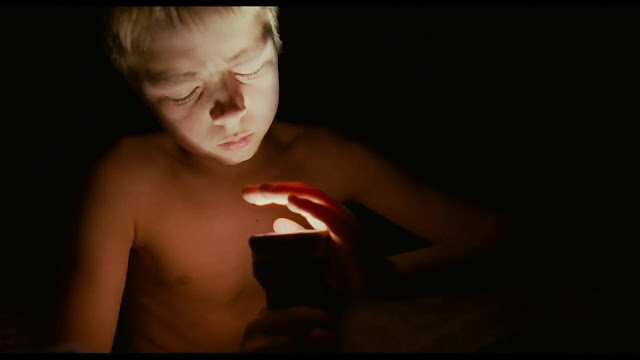May 30, 2011 [The Tree of Life]
I'll begin with Darwin:
 On the surface, though, of both his eyes and the film, all we have is a middle-aged man remembering a hard father, a gone family, and his life since then. But there are dinosaurs, and tide pools, and what we used to call the "smoke man" clouding the suburban streets with mosquito-killing stuff that's getting into our DNA to spread like light from a flashlight swung in a child's hand, arcing in the early night to form a tenuous dome, a protected station where some things still flourish and fill the earth.
On the surface, though, of both his eyes and the film, all we have is a middle-aged man remembering a hard father, a gone family, and his life since then. But there are dinosaurs, and tide pools, and what we used to call the "smoke man" clouding the suburban streets with mosquito-killing stuff that's getting into our DNA to spread like light from a flashlight swung in a child's hand, arcing in the early night to form a tenuous dome, a protected station where some things still flourish and fill the earth.
Are those things memories? Are they atoms? The Tree of Life conjures the former and charts the latter, and concludes they may be the same: Our lives whisper in our ears with others' voices, gone mother and father and brother, hide-and-seek as the night falls—but I can hear laughter, and follow it into the Earth's core, where the other kids wait, hiding just long enough to spring out and change me almost imperceptibly, but still changing.
“The affinities of all the beings of the same class have sometimes been represented by a great tree. I believe this simile largely speaks the truth. The green and budding twigs may represent existing species; and those produced during former years may represent the long succession of extinct species. At each period of growth all the growing twigs have tried to branch out on all sides, and to overtop and kill the surrounding twigs and branches ... . The limbs divided into great branches, and these into lesser and lesser branches, were themselves once, when the tree was young, budding twigs ... . Of the many twigs which flourished when the tree was a mere bush, only two or three, now grown into great branches, yet survive and bear the other branches ... . From the first growth of the tree, many a limb and branch has decayed and dropped off ... . [We] here and there see a thin straggling branch springing from a fork low down in a tree, and which by some chance has been favoured and is still alive on its summit ... . As buds give rise by growth to fresh buds, and these, if vigorous, branch out and overtop on all sides many a feebler branch, so by generation I believe it has been with the great Tree of Life, which fills with its dead and broken branches the crust of the earth, and covers the surface with its ever-branching and beautiful ramifications.”Like Thomas Jefferson's Bible—from which he cut out all the miracles—I've also edited this passage from The Origin of Species—except in a reversal of Jefferson's effort: I've left in the poetry, and elided the science, so that the Tree stands on its own over the entire "crust of the earth." In making his movie, Terrence Malick seems also to have read this passage—but without any editing: He simply may have stared at it, allowed the words to melt into one another—and then meditated on the resulting shape, slowly and quietly, until he saw a spot of color come streaming from the center of it, and watched it spread like the light show at the end of 2001 until it changed the color of his eyes as it did Dave Bowman's in Kubrick's picture, day-glo irises like the Richard Avedon portraits of the Beatles, transcended pop and mystic movies.
 On the surface, though, of both his eyes and the film, all we have is a middle-aged man remembering a hard father, a gone family, and his life since then. But there are dinosaurs, and tide pools, and what we used to call the "smoke man" clouding the suburban streets with mosquito-killing stuff that's getting into our DNA to spread like light from a flashlight swung in a child's hand, arcing in the early night to form a tenuous dome, a protected station where some things still flourish and fill the earth.
On the surface, though, of both his eyes and the film, all we have is a middle-aged man remembering a hard father, a gone family, and his life since then. But there are dinosaurs, and tide pools, and what we used to call the "smoke man" clouding the suburban streets with mosquito-killing stuff that's getting into our DNA to spread like light from a flashlight swung in a child's hand, arcing in the early night to form a tenuous dome, a protected station where some things still flourish and fill the earth. Are those things memories? Are they atoms? The Tree of Life conjures the former and charts the latter, and concludes they may be the same: Our lives whisper in our ears with others' voices, gone mother and father and brother, hide-and-seek as the night falls—but I can hear laughter, and follow it into the Earth's core, where the other kids wait, hiding just long enough to spring out and change me almost imperceptibly, but still changing.



Comments
Post a Comment